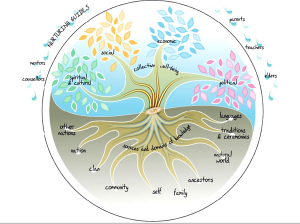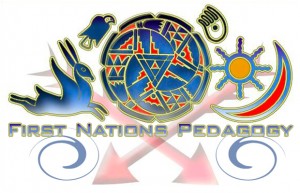First Nations Holistic Lifelong Learning
This is such a great website!
http://cli.ccl-cca.ca/FN/index.php?q=home
On this site you can explore the elements of the First Nations Holistic Lifelong Learning Model. My term project is looking at ways to support adults undertaking eLearning endeavors, so having an understanding of what a model of learning looks like for indigenous peoples is essential. I love the visuals and interactive components of the site. In the model you’ll read, “Raindrops depict learning guides such as mentors, counsellors, parents, teachers, and Elders. These individuals provide the learner with opportunities to develop mentally, spiritually, emotionally, and physically throughout the lifespan, and are an integral part of a cyclical, lifelong learning process”.
November 6, 2011 No Comments
Optimizing the Effectiveness of E-Learning for First Nations
This is a 2010 document published by “The Conference Board of Canada”. It looks at ways in which eLearning can narrow the gap between First Nations people living on reserves and non-Aboriginal people in Canada. The findings are based only on a brief literature review, but it does present a list of 11 recommendations supported by other research I have encountered.
November 6, 2011 No Comments
First Nations Pedagogy Dialogue – Blog
While looking for resources to support online learners I came across this blog. (http://firstnationspedagogy.com/blog/). It has pages for education, activism, governance, health, history, knowledge, and featured articles. There are podcasts, videos, images, information, and dialogue on all these aspects. There are not a lot of entries from the past two years, but the information is still very relevant and well presented.
November 6, 2011 No Comments
Educating the Aboriginal Child
I have been surfing the net to find resources that will help me with my focus of educating the First Nations child in a regular school. I need to find resources that will teach me ways to reach out to my First Nation students and tell me why these methods would be effective. There are lots of sites and documents but after our journey through this course I am very cautious about what I choose. From the plethora of information I have to find meaningful, authentic sources. After our readings about non aboriginal researchers and their tainted work, the wannabee Indians and their half-baked philosophies, and the passionate Indian radicals without sound traditional reasoning, I have to sift and sort to find some gold nuggets.
There is much work out there done by First Nation researchers or work by non-aboriginals that has the support and approval of the First Nations people. I have found articles about the history of First Nations education, the First Nations Pedagogical beliefs, challenges faced by First Nation students in schools on and off reserves, and learning styles that are conducive to educating a First Nations child. There are documents from various education ministries from all over Canada in which they propose and approve of ways in which First Nation beliefs can be incorporated into to regular teaching content to make the learning more applicable, and in my opinion more complete. Here are some of them:
1. Learning Styles of American Indian/Alaska Native Students: A Review of the Literature and Implications for Practice
By Cornel Pewewardy
2. Aboriginal Education in Canada: A Retrospective and a Prospective
By Verna J. Kirkness
3. Joining the Circle: A Practitioner’s Guide to Responsive Education for Native Students By Agnes Grant and LaVina Gillespie
4. Culturally Relevant Pedagogy: First Nations Education in Canada
By Faith Maina
5. Teaching in a First Nations School: An Information Handbook for Teachers New to First Nations Schools
2006 by First Nation Summit of British Columbia
6. Some Ministry Documents:
INTEGRATING ABORIGINAL PERSPECTIVES INTO CURRICULA: A Resource for Curriculum Developers, Teachers, and Administrators 2003 Manitoba Education
Ontario First Nation, Métis, and Inuit Education Policy Framework (2007) @
Shared Learning British Columbia
November 5, 2011 No Comments
Stolen Children: Truth & Reconciliation
Stolen Children: Truth & Reconciliation
Sponsored by CBC, Stolen Children: Truth & Reconciliation is rich collection of resources that help provide a historical account of residential schools and their lasting impact on Aboriginal people. It also documented the efforts of the The Truth & Reconciliation Commission (TRC), which was established by the Canadian government as an independent body to oversee the safe disclosure of individual experiences by former residential school students in a culturally respectful manner as part of the Residential Schools Settlement Agreement. Their mandate also includes helping reconcile the relationship between Aboriginal and Non-Aboriginal Canadians by raising awareness around the impact of the residential school sytem and its lasting effects that continue to affect people and communities today, although it’s a part of history that many Canadian’s continue to be fully aware of.
The site includes current news coverage as well as CBC Digital Archive videos to help illustrate a timeline of Aboriginal education policies in Canada. The sharp contrast in early propaganda produced to encourage residential school attendance to the 2008 apology by the Canadian government provide an eye-opening view to begin processing a more comprehensive understanding of the need for social and restorative justice.
November 1, 2011 No Comments
Promising Practices
The Promising Practices website is an online resource for educators and others to promote and share successful practices to enhance the classroom experience for Aboriginal students. The site is part of an umbrella of resources sponsored by the Martin Aboriginal Education Initiative (MAEI). The site includes a variety of curricula from Canada and around the world, including classroom practices, childhood development methods and guides to promote interaction between educators and the Aboriginal communities they serve.
October 17, 2011 No Comments
Aboriginal Education, The Agenda with Steve Paikin
On The Agenda with Steve Paikin, discusses Aboriginal education. They start off by looking at three graphs that examine the population growth in Canada, unemployment rates and education achievement and compare the differences between non-aboriginal population in Canada to the Aboriginal population in Canada. The graph on “education achieved” looks at young people ages 20-24 who have received a diploma for high school, trades, college, and/or university. It also compares the educational difference between aboriginals who live on a reserve verses those who live off a reserve. They then look in-depth into the numbers and discuss how to get aboriginal young people to graduate high school and ultimately go on to post-secondary education.
October 17, 2011 No Comments
Aboriginal Education in Timmins
Aboriginal education in Timmins looks at urban education for aboriginal students, specifically raising awareness to the needs of the aboriginal children transitioning from reserves to places like Timmins, Ontario and how important it is to get them engaged with the classroom. They also discuss the alarming number of aboriginal students that have not graduated from high school.
October 17, 2011 No Comments
Aboriginal Education: Solutions for the Future
Aboriginal Education’s presents Ogden Public school in Thunder Bay; a successful school that balances both the aboriginal culture and teachings alongside the standard Ontario education. This program also discusses what needs to be done to bring about change in the education system for aboriginal students. Asking questions like: do schools need more money and resources? Do they need more culture in the curriculum? Can the present system meet the needs of Aboriginal children or do we need something completely different? They also discuss specific things that aboriginal students need to make sure they succeed.
October 17, 2011 No Comments
Aboriginal Education Strategy
Aboriginal Education Strategy is part of the Ontario Ministry of Education website; their basic goal is to bring awareness to Aboriginal Education Strategies to help “students achieve their full potential”. They provide links to policies that are in place, curriculum for native studies and native languages along with the background of aboriginal education initiatives in Ontario.
October 17, 2011 No Comments


